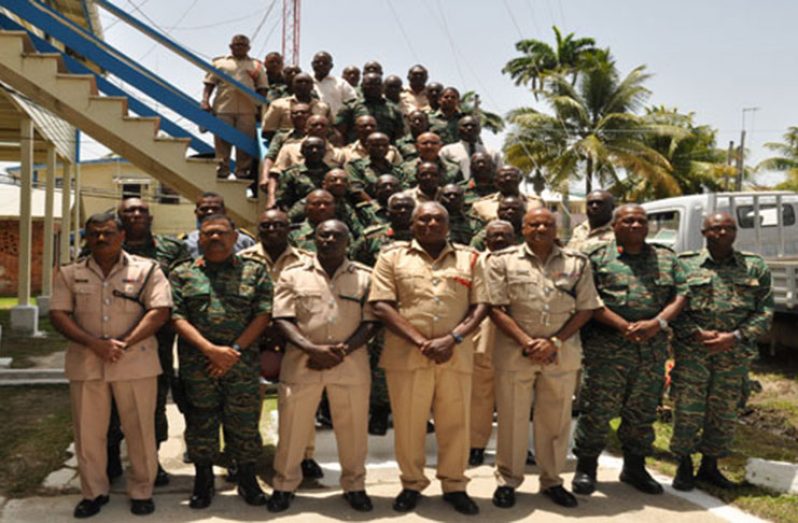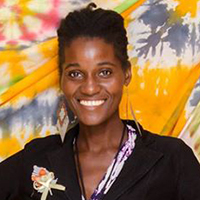…joint services get tough on tattooed ranks
THE joint services have taken a decision to rigidly enforce policies governing its personnel and have turned away several new recruits sporting visible tattoos, while giving ranks with the body art a few months to get them removed.
While a young man took to the media with his plight of being turned away from accomplishing his military dream because of having the clearly visible skin designs, many are left to wonder, “Should legal policies governing an organisation be adjusted to accommodate a common trend?”
Dictionary definition of a tattoo is that it “is a form of body modification, made by inserting ink, either indelible or temporary, into the dermis layer of the skin to change the pigment.”
All must uphold policy
Tattooing has become a popular style, and many younger people go wild, branding their skin with a design without understanding the consequences. The Guyana Defence Force (GDF) Public Relations Personnel, Major Delbert George said Tuesday there are policies outlining the operations of the army and all of its officers, including new recruits, must uphold the standards of the military.
He said the regulation speaks to tattoos that are visible in any form of military attire, including PC shorts and military training T-shirts. Article 4066 within the GDF Personnel Policy which was seen by the Guyana Chronicle, clearly states that “Ranks shall not acquire tattoos that are visible while wearing military uniform or any kit while engaged in organised sports, except swimming, or tattoos that could be deemed to be offensive (for example, being pornographic, blasphemous, racist or political) or otherwise bring discredit to the Guyana Defence Force.”
The policy is not against officers wearing tattoos in places that will result in them being displayed while in military attire, including military uniform and military T-shirts and shorts during physical exercise. Army hopefuls sporting tattoos on the chest and ‘number plates’ may be allowed if the individual otherwise qualifies to become a GDF Officer.
With the rigid training and practices within the military which involves body contact, the military policies Article 4067 also states “Tattooing is discouraged as it can lead to damage of the blood vessels and even HIV infection. It has also been observed that tattoos have a negative impact on employment opportunities in the civilian sector.”
One concerned citizen took to social media and criticised the move of the GDF to turn away new recruits who sport tattoos, calling the army’s policy an “archaic regulation.” The comment stated that in enforcing this policy, the GDF is preventing young people ready to serve the country from doing so, at a time when Guyana’s sovereignty is under threat.
The commenter suggested that traditions be broken from the law which was written since in the 1950s since, with such rule being upheld, the GDF could possibly soon be an army of men senior in age. Many youths tattoo for style before even considering a career and have the skin art in places which can be visible even in uniforms.
May 2 deadline
Meanwhile, Police Public Relations Officer, Jairam Ramlakan said individuals have been turned away by the Guyana Police Force because the same policy which the army applies is used by the Guyana Police Force (GPF) and all other members of the joint services. “As long as you have visible tattoos on any part of your body, you wouldn’t be enlisted…a lot of young people qualify but they have the tattoos,” Ramlakan told the Guyana Chronicle on Tuesday.
He said while the GPF would also inform the young recruits that they should remove the tattoos and return to complete test, it is aware that the process of removing the body art is quite expensive.
A source from the Guyana Fire Service also told the Guyana Chronicle that recently the force enforced the policy of refusing to accept persons with visible tattoos and has asked all staff with such to remove them by May 2.
One member of the joint services told the Guyana Chronicle she was given a May 2 deadline to remove the tattoos. She said she consulted a local hospital and was told that she must first pay $4000 consultation fee to arrange for the tattoos to be removed. She said fees to remove the tattoos vary per session and it takes over five sessions to remove them. $5000 is charged for the removal of a small tattoo, $10, 000 to remove a medium size and $15,000 for the removal of a large tattoo.
Several members of the joint services have tattoos visible on their bodies.












